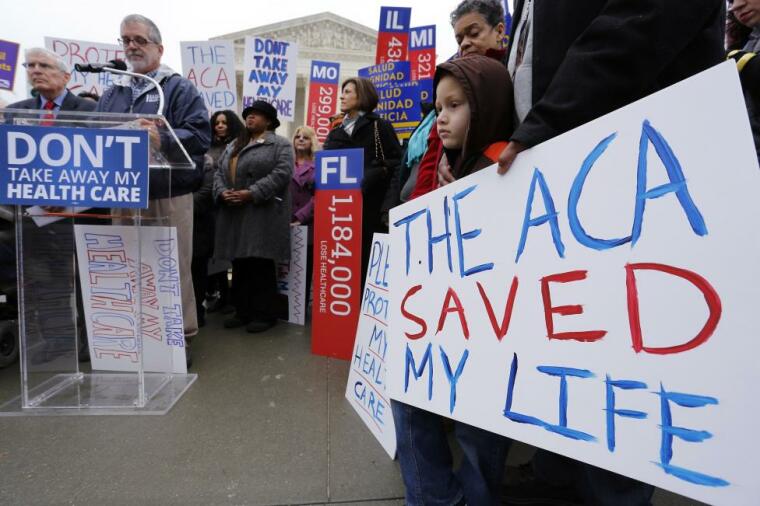Obamacare News 2015: Supreme Court Divided on Obamacare With Tax Subsidy Issue as Battleground

The U.S. Supreme Court has found itself sharply divided on ideological lines as it tackled a second major challenge to President Obama's healthcare law.
The nine justices on Wednesday heard 85 minutes of arguments in the case brought by conservative opponents of the law who contend its tax credits aimed at helping people afford medical insurance should not be available in most states.
The justices are divided on the tax subsidy issue in the Affordable Care Act with one justice – Justice Anthony Kennedy – emerging as a likely swing vote in a ruling.
Opponents of the law dubbed Obamacare said tax credits aimed at helping people afford medical insurance should not be made available in most states, according to Reuters.
If the Supreme Court rules in favor of the challengers, this could cripple the law, which is Obama's centerpiece health program.
Justice Kennedy, a conservative, said there would be negative impact if the U.S. government loses the case although he did not indicate how he would vote on the issue.
Chief Justice John Roberts, who cast the swing vote that upheld the law in 2012, also did not indicate how he would vote. Four liberal justices appeared to support Obamacare while conservatives Antonin Scalia and Samuel Alito asked questions sympathetic to the challengers.
If the government loses the case, Reuters reported, up to 7.5 million people in at least 34 states would lose tax subsidies that allow low and moderate income people to purchase private health insurance, according to Avalere Health.
The phrase "established by the state" in the law is the main issue in the case.
Kennedy said if Obamacare allows subsidies only for states that established their own insurance exchanges, it would raise new question on whether the law is unconstitutionally coercive by punishing states that fail to establish exchanges.
"There's a serious constitutional problem if we adopt your argument," Kennedy told the proponents of Obamacare.
On the other hand, he said throwing out subsidies would cause an insurance "death spiral" because premiums would increase.
Most of the 50 states in the U.S. have not created exchanges. Thirteen states and the District of Columbia have them, with another 34 run by the federal government and three operating as state-federal hybrids, according to Reuters.
Scalia said Congress could amend the law to avoid disruption if the government loses the case.
White House spokesman Josh Earnest said there are "no contingency plans that could be implemented that would prevent the catastrophic damage" if the Supreme Court favors the challengers.
 Christians don't have to affirm transgenderism, but they can’t express that view at work: tribunal
Christians don't have to affirm transgenderism, but they can’t express that view at work: tribunal Archaeology discovery: Medieval Christian prayer beads found on Holy Island
Archaeology discovery: Medieval Christian prayer beads found on Holy Island Presbyterian Church in America votes to leave National Association of Evangelicals
Presbyterian Church in America votes to leave National Association of Evangelicals Over 50 killed in 'vile and satanic' attack at Nigerian church on Pentecost Sunday
Over 50 killed in 'vile and satanic' attack at Nigerian church on Pentecost Sunday Ukrainian Orthodox Church severs ties with Moscow over Patriarch Kirill's support for Putin's war
Ukrainian Orthodox Church severs ties with Moscow over Patriarch Kirill's support for Putin's war Islamic State kills 20 Nigerian Christians as revenge for US airstrike
Islamic State kills 20 Nigerian Christians as revenge for US airstrike Man who served 33 years in prison for murder leads inmates to Christ
Man who served 33 years in prison for murder leads inmates to Christ


 Nigerian student beaten to death, body burned over ‘blasphemous’ WhatsApp message
Nigerian student beaten to death, body burned over ‘blasphemous’ WhatsApp message 'A new low': World reacts after Hong Kong arrests 90-year-old Cardinal Joseph Zen
'A new low': World reacts after Hong Kong arrests 90-year-old Cardinal Joseph Zen Iran sentences Christian man to 10 years in prison for hosting house church worship gathering
Iran sentences Christian man to 10 years in prison for hosting house church worship gathering French Guyana: Pastor shot dead, church set on fire after meeting delegation of Evangelicals
French Guyana: Pastor shot dead, church set on fire after meeting delegation of Evangelicals ‘Talking Jesus’ report finds only 6% of UK adults identify as practicing Christians
‘Talking Jesus’ report finds only 6% of UK adults identify as practicing Christians Mission Eurasia ministry center blown up in Ukraine, hundreds of Bibles destroyed: 'God will provide'
Mission Eurasia ministry center blown up in Ukraine, hundreds of Bibles destroyed: 'God will provide' Church holds service for first time after ISIS desecrated it 8 years ago
Church holds service for first time after ISIS desecrated it 8 years ago Burger King apologizes for 'offensive campaign' using Jesus' words at the Last Supper
Burger King apologizes for 'offensive campaign' using Jesus' words at the Last Supper Uganda: Muslims abduct teacher, burn him inside mosque for praying in Christ’s name
Uganda: Muslims abduct teacher, burn him inside mosque for praying in Christ’s name